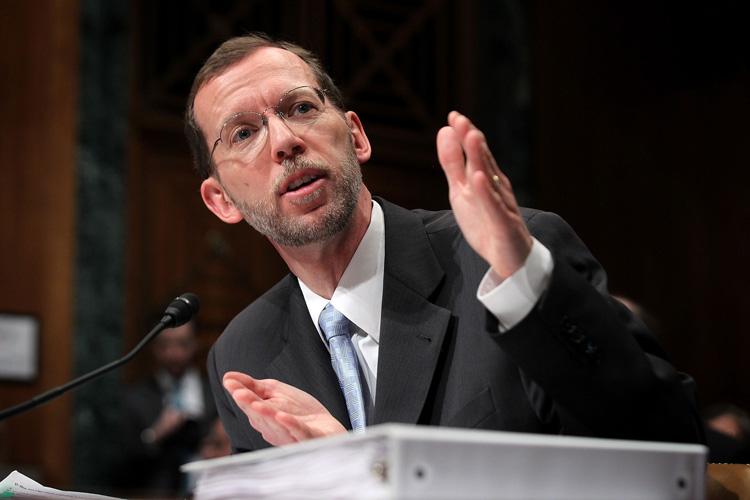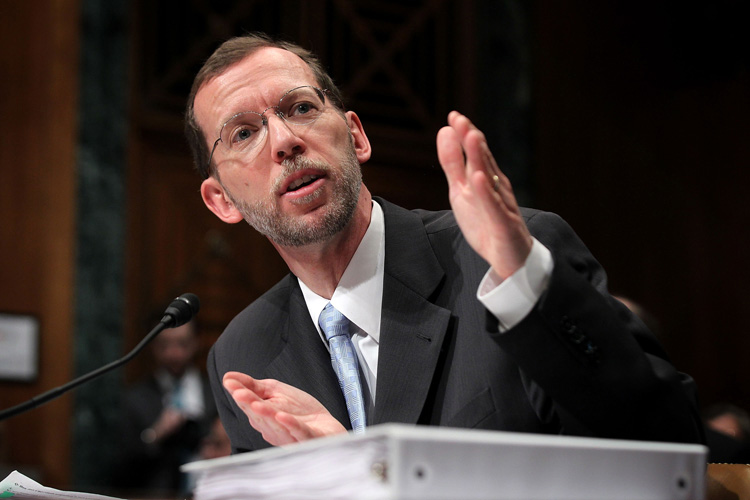The Congressional Budget Office (CBO) releases its 10-year Budget and Economic Outlook during the first month of every year. There was no exception in 2012, as the CBO released its outlook on Jan. 31, followed by the testimony of economist Douglas W. Elmendorf, director at the CBO, to the Committee on the Budget in the U.S. Senate on Feb. 2.
Elmendorf gave a rather gloomy forecast on the U.S. economy, suggesting that the United States’s unprecedented high budget deficit is closely connected to the U.S. economic health and will not improve significantly until the economy rebounds.
“How much and how quickly the deficit declines will depend in part on how well the economy does over the next few years. Probably more critical, though, will be the fiscal policy choices made by lawmakers,” Elmendorf testified.
Statisticians suggest that depending on the statistics that were used, the projected outcome could differ significantly. Concerning the deficit, the numbers provided to the public are net figures and do not include the gross federal debt.
“The sad fact is that statistics are ridiculously easy to manipulate. ... There are literally hundreds of ways to manipulate statistics,” according to an article about statistical manipulation on the Effective Meetings website.
The gross federal debt increases substantially more than the amount of the deficit each year. That is because a considerable amount of federal borrowing is not counted in the budget.
The gross federal debt is the entire debt the U.S. federal government has accumulated, including IOUs for approximately $2.6 trillion at mid-2011, which are owed to the Social Security Trust Fund.
Government-sponsored enterprises (GSE), including the Federal Home Loan Mortgage Corp. (Freddie Mac) and two off-budget agencies, the Social Security Trust Fund and the U.S. Postal Service, are not included in the federal budget and thus are not part of the budget deficit. Yet, they have the full faith and credit guarantee of the United States and in the case of the U.S. Postal Service, Freddie Mac, and Fannie Mae, hit the United States with an enormous debt.
The debt by Freddie Mac, Fannie Mae, and the Postal Service “exposes the taxpayers to losses, but it is not accounted for as government debt. As the Federal Reserve carefully notes in its ‘Flow of Funds’ report, non-budget agency and GSE debt is not ’considered officially to be part of the total debt of the federal government,'” according to an article on the American website.
During the U.S. government fiscal year (FY) 2012, the gross federal debt is predicted to reach $16.7 trillion, while in FY 2011, the actual gross federal debt reached $15.5 trillion. It reached $13.5 trillion in FY 2010, $11.9 trillion in FY 2009, and $10 trillion in FY 2008.
The numbers used by the CBO state that the FY 2012 deficit is predicted to be $1.1 trillion, a $198 billion reduction from 2011 and a $192 billion reduction from 2010.
“The federal budget deficit—although starting to shrink—remains very large by historical standards,” said Elmendorf in his testimony, published on the CBO website.
Slow Pace of Economic Recovery
“The pace of the economic recovery has been slow since the recession ended in June 2009, and the Congressional Budget Office (CBO) expects that, under current laws governing taxes and spending, the economy will continue to grow at a sluggish pace over the next two years,” according to the CBO report.
The U.S. economic recovery will continue to be sluggish and is predicted not to improve significantly until 2018.
The CBO predicts that the unemployment rate will not subside significantly during this and next year, hovering around 8 percent and then 7 percent for the years 2014 and 2015.
Factors that negatively influence a speedier recovery are fiscal policy decisions by legislators, especially given that special tax provisions will end, including a lower income tax rate, and additional taxes, fees, and penalties will come into effect.
The CBO suggests in its report that “discretionary spending is projected to decline to 5.6 percent of GDP in 2022—the lowest level in the past 50 years. Those constraining factors will be partially offset by increases in spending for mandatory programs, particularly Social Security, Medicare, Medicaid, and other federal health care programs.”
But, Social Security is funded by deductions from a worker’s paycheck through the Social Security payroll tax and thus not funded by U.S. income and other taxes and not part of the budget.
A 2002 entry on the CBO website states, “By law, the Social Security program is treated as an ‘off-budget’ entity, and its financial figures are displayed separately from the rest of the budget.”
Predicting America’s Economic Health Down the Road
“Many developments could cause economic outcomes to differ substantially, in one direction or another, from those that CBO has projected,” according to testimony by Elmendorf.
If the economic recovery accelerates more rapidly than predicted by the CBO, its predictions are no longer valid. Also, should the European banking sector be faced with a meltdown or the European Union economic situation deteriorate any further, international markets can not escape being affected, and thus a worsening of the U.S. economy would ensue and require different predictions.
Should present conditions remain static and not affect the CBO base line, economic growth in 2012 would be faster than that of 2011. However, given new fiscal policies coming into effect in 2013, the economy would markedly slow down. The outlook for 2014 is more positive, and the CBO expects the economy to become stronger.
According to the CBO quarterly report, the fiscal policies have been injected with “the government’s automatic fiscal stabilizers.” These fiscal stablizers “provide fiscal support when the economy is below its potential, and they provide fiscal restraint when the economy is above its potential,” such as “when GDP falls relative to potential GDP during a recession, the reduction in income causes tax liabilities (and, therefore, revenues) to decrease automatically.”
OMB Disputes CBO Findings
The Office of Management and Budget (OMB) does not agree with the assumption and base lines used by the CBO. “Their analysis [CBO] leads them to a different projection of the deficit picture, and it’s worth understanding our analytical differences,” according to an OMB rebuttal published on its website.
The OMB points to two major differences, one of them being transportation infrastructure investments, which are part of the president’s 2012 budget. These investments should come through a bipartisan government effort, while the CBO viewed it as a private sector initiative. Also, the president earmarked funds to pay for medical costs under the Medicare program for at least three years and thus set a precedent for future funding, while the CBO ignored this in its predictions.
Secondly, the OMB believes that the economy will heal itself at an accelerated pace and not remain sluggish over an extended period.
“There is large uncertainty in economic projections and differences of opinion when it comes to assessing individual policies. But regardless of our differences, CBO confirms what we already know: current deficits are unacceptably high, and if we stay on our current course and do nothing, the fiscal situation will hurt our recovery and hamstring future growth,” said the OMB in its rebuttal to the CBO predictions.






